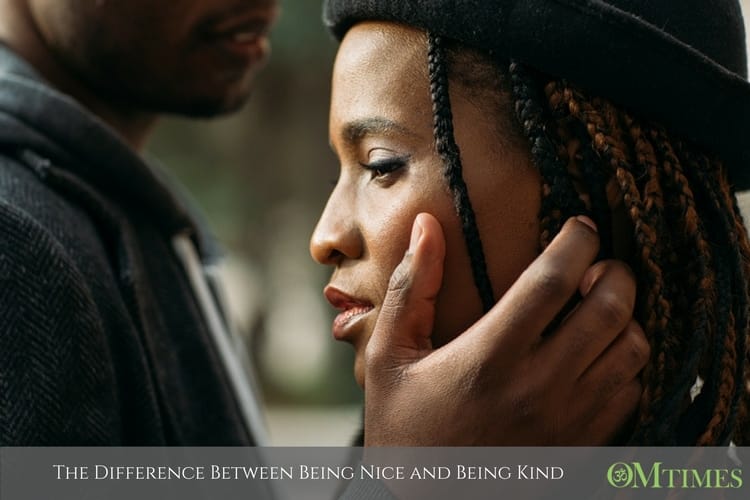The Difference Between Being Nice and Being Kind

Are you nice or kind?
What Is the Difference Between Being Nice and Being Kind
 You’ve heard the phrase, “So-and-so is a really nice person,” and probably thought nothing of it. In my work, though, I think a lot about what it means to be “really nice” as I see a major distinction between being nice and being genuinely kind.
You’ve heard the phrase, “So-and-so is a really nice person,” and probably thought nothing of it. In my work, though, I think a lot about what it means to be “really nice” as I see a major distinction between being nice and being genuinely kind.
The way I understand it, kindness emerges from someone who’s confident, compassionate and comfortable with themselves. A kind person is loving and giving out of the goodness of their heart.
At the root of extreme niceness, however, are feelings of inadequacy and the need to get approval and validation from others.
Overly-nice people try to please so that they can feel good about themselves.
Genuinely kind people are giving because it’s in their nature to care, and since they have no ulterior motives, they aren’t concerned with whether or not other people like them.
Kind people can be assertive and set good limits. Nice people, on the other hand, bend over backward to be obliging.
They deal with potential conflicts by placating the other person because they can’t bear to have anyone upset with them.
Kind people have good self-esteem and because they love themselves as much as they care about others, they expect to be treated with respect.
Nice people are desperate for approval, so they’re often mistreated or taken advantage of.
Nice people tend to do too much for those who don’t deserve it and are easy prey for users. They get into co-dependent relationships in which they care-take others in the hopes of eventually being cared for themselves.
This co-dependent interaction, however, is a lose-lose for everyone involved. The nice person fails to get the love and approval they seek, and the person on the receiving end never feels like they’re getting enough care. Instead of being grateful, they become resentful toward the pleaser.
Kind people take responsibility for their own self-care. They’re generous, even altruistic, but don’t get caught up in a user-pleaser type of relationship.
The nice person is careful not to offend anyone and wouldn’t dream of expressing a “negative” emotion. They focus on being good to others, to the detriment of their own needs. In fact, they’re afraid to ask for what they want for fear of creating conflict.
Nice people stuff down their feelings, not wanting to be a bother to anyone, but the problem with this is that emotions can’t be kept down indefinitely.
Feelings and needs are meant to be expressed and when they’re repressed, they find another outlet.
Being nice, then, has unforeseen consequences: it’s painful to seek affirmation but receive contempt. Always holding back needs, feelings and opinions adds to their frustration.
Ultimately, the frustration grows into anger, but showing this anger is unacceptable to someone so invested in always being pleasant. They’re compelled to suppress any “bad” feelings.
As the nice person continues to please everyone and the anger simmers underneath the surface, the pressure builds up. At some point, emotions begin to leak, in the form of snarky comments, whining, needling, sarcasm, passive-aggressive behavior or even outbursts of rage.
When a nice person leaks resentment it’s usually met with surprise or with more anger, which reinforces their belief that anger should never be expressed.
A vicious circle is created in which the nice person pleases others, becomes resentful, represses and then leaks their anger and then represses their feelings some more. As a result, I believe they’ll often get caught up in addictive behaviors which are meant to compensate for their mounting frustration.
I have found that nice people will often turn to starchy, fatty or sugary “comfort foods” to help them to stuff down their anger and soothe their hurt feelings. They’ll sometimes abuse alcohol or turn to tranquilizers to anesthetize their pain. Some will go on spending sprees, trying to buy themselves happiness.
The nice person is overly-invested in the emotional payoff they’re hoping to achieve by pleasing and taking care of others.
They’re also unwilling to face how much hurt or anger they’re carrying. They’re resistant to changing their behavior, despite the consequences of their compensatory addictions.
Kind people are happy people, to begin with, and add to their happiness through acts of generosity and altruism. Nice people are needy people who inadvertently create more and more unhappiness for themselves.
The nice person has to understand that their self-worth can never be improved by being a pleaser. They must learn how to validate themselves independently of others, and let go of the co-dependent relationships which foster mutual animosity.
When the overly-nice person can let go of the urge to please, they’ll be able to identify their real needs and feelings and begin to take proper care of themselves.
They can find happiness in pursuing meaningful activities and relationships instead of giving too much, becoming resentful and developing nasty addictions along the way.
You will also enjoy What Provokes Us to Be Mean to Nice People?
About the Author
Marcia Sirota MD FRCP(C) is a board-certified psychiatrist, that does not ascribe to any one theoretical school. Rather, she has integrated her education and life experiences into a unique approach to the practice of psychotherapy. She considers herself a realist with a healthy measure of optimism. Sign up here for her free monthly wellness newsletter.
Dr. Marcia Sirota is a Toronto-based board certified psychiatrist specializing in the treatment of trauma and addiction, as well as founder of the Ruthless Compassion Institute, whose mandate is to promote the philosophy of Ruthless Compassion and in so doing, improve the lives of people, everywhere.











They are simple, yet not. They divide down the fractal line, analagous to empathy versus comapassion. HEAL YOURSELF FIRST they it will become clearer. One cannont know what one does not know.And codependence is an indwelling hazard.
When I initially read this article, I have to say, I blew it off – and said to myself that I didn’t know if I agreed with it or not, but I’d keep it around in my brain to think about and revisit. Then, the difference between kind and nice erupted right in front of me, on an interpersonal level, late last week. Today, I revisited this article with great appreciation – I have painfully acquired new insight to a concept that has been in front of me all along that I wasn’t sensing. Thank you.
Can you say, “Hit the nail on the head?” Perfectly worded. Great article. I have seen this same exact behavioral patterns with these two types of individuals. I hope many people read this and learn to accept themselves for who they for only then will they ever become genuinely kind people. <3
Great article. I completely agree with the author, and I am actually about to publish a book related to the same topic. I agree about addictions, such as shopping, appearances, or even antidepressants. While kindness originates from the 4th, heart chakra, pleasing others might block the 2nd, related to reproductive organs and, in extreme cases, can even result in serious diseases, such as cancer. Very well explained. I’ll definitely mention this article in my book.
Wondering if being a “nice”person is the early stages of being a “kind” one…as in growth.
Every one starts somewhere. Not everyone is Born kind in their natural state but through enlightenment and growth ontheir journey they may develop into the gentle butterfly.
Just a thought…